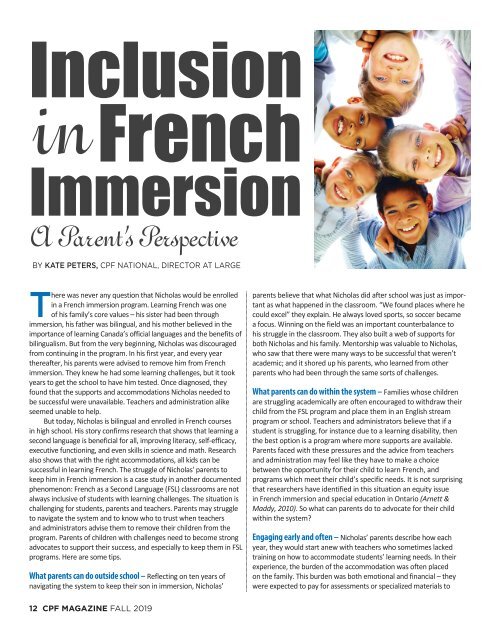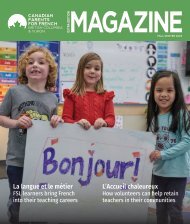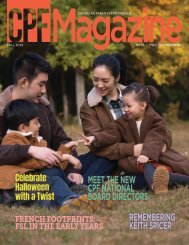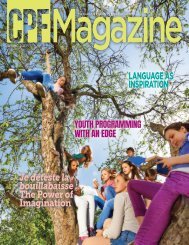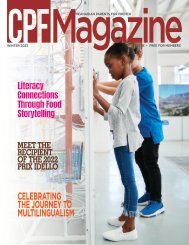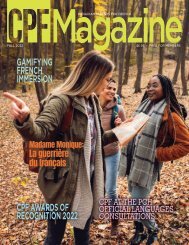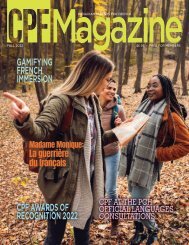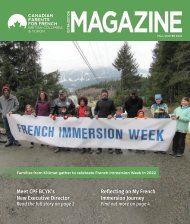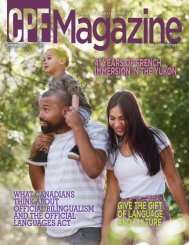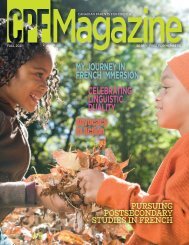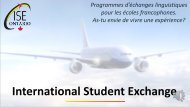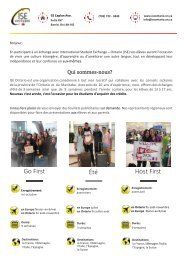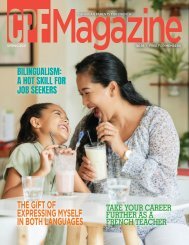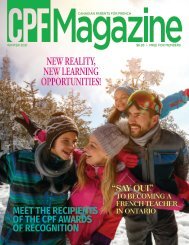CPFMagazine Fall 2019 Issue
A national network of volunteers, parents and stakeholders who value French as an integral part of Canada. CPF Magazine is dedicated to the promotion and creation of French-second-language learning opportunities for young Canadians.
A national network of volunteers, parents and stakeholders who value French as an integral part of Canada. CPF Magazine is dedicated to the promotion and creation of French-second-language learning opportunities for young Canadians.
Create successful ePaper yourself
Turn your PDF publications into a flip-book with our unique Google optimized e-Paper software.
Inclusion<br />
in French<br />
Immersion<br />
A Parent’s Perspective<br />
BY KATE PETERS, CPF NATIONAL, DIRECTOR AT LARGE<br />
There was never any question that Nicholas would be enrolled<br />
in a French immersion program. Learning French was one<br />
of his family’s core values – his sister had been through<br />
immersion, his father was bilingual, and his mother believed in the<br />
importance of learning Canada’s official languages and the benefits of<br />
bilingualism. But from the very beginning, Nicholas was discouraged<br />
from continuing in the program. In his first year, and every year<br />
thereafter, his parents were advised to remove him from French<br />
immersion. They knew he had some learning challenges, but it took<br />
years to get the school to have him tested. Once diagnosed, they<br />
found that the supports and accommodations Nicholas needed to<br />
be successful were unavailable. Teachers and administration alike<br />
seemed unable to help.<br />
But today, Nicholas is bilingual and enrolled in French courses<br />
in high school. His story confirms research that shows that learning a<br />
second language is beneficial for all, improving literacy, self-efficacy,<br />
executive functioning, and even skills in science and math. Research<br />
also shows that with the right accommodations, all kids can be<br />
successful in learning French. The struggle of Nicholas' parents to<br />
keep him in French immersion is a case study in another documented<br />
phenomenon: French as a Second Language (FSL) classrooms are not<br />
always inclusive of students with learning challenges. The situation is<br />
challenging for students, parents and teachers. Parents may struggle<br />
to navigate the system and to know who to trust when teachers<br />
and administrators advise them to remove their children from the<br />
program. Parents of children with challenges need to become strong<br />
advocates to support their success, and especially to keep them in FSL<br />
programs. Here are some tips.<br />
What parents can do outside school – Reflecting on ten years of<br />
navigating the system to keep their son in immersion, Nicholas’<br />
parents believe that what Nicholas did after school was just as important<br />
as what happened in the classroom. “We found places where he<br />
could excel” they explain. He always loved sports, so soccer became<br />
a focus. Winning on the field was an important counterbalance to<br />
his struggle in the classroom. They also built a web of supports for<br />
both Nicholas and his family. Mentorship was valuable to Nicholas,<br />
who saw that there were many ways to be successful that weren’t<br />
academic; and it shored up his parents, who learned from other<br />
parents who had been through the same sorts of challenges.<br />
What parents can do within the system – Families whose children<br />
are struggling academically are often encouraged to withdraw their<br />
child from the FSL program and place them in an English stream<br />
program or school. Teachers and administrators believe that if a<br />
student is struggling, for instance due to a learning disability, then<br />
the best option is a program where more supports are available.<br />
Parents faced with these pressures and the advice from teachers<br />
and administration may feel like they have to make a choice<br />
between the opportunity for their child to learn French, and<br />
programs which meet their child’s specific needs. It is not surprising<br />
that researchers have identified in this situation an equity issue<br />
in French immersion and special education in Ontario (Arnett &<br />
Maddy, 2010). So what can parents do to advocate for their child<br />
within the system?<br />
Engaging early and often – Nicholas’ parents describe how each<br />
year, they would start anew with teachers who sometimes lacked<br />
training on how to accommodate students’ learning needs. In their<br />
experience, the burden of the accommodation was often placed<br />
on the family. This burden was both emotional and financial – they<br />
were expected to pay for assessments or specialized materials to<br />
12 CPF MAGAZINE FALL <strong>2019</strong>


